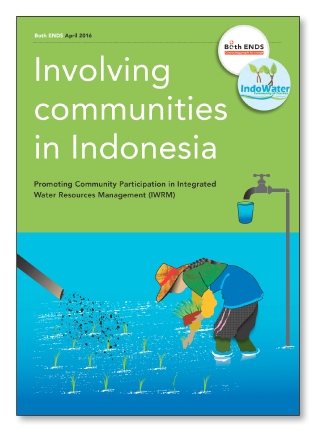To address the Indonesian water crisis, Both ENDS and three Indonesian organisations – Yayasan Mitra Insani in the Kampar River Basin, Komunitas Peduli Ciliwung (KPC) Bogor in the Ciliwung River Basin, and ECOTON in the Brantas River Basin – teamed up to form the IndoWater Community of Practice (CoP) in 2014.
The Indonesian groups, like their counterparts in Africa, have extensive experience working with communities. By working together and sharing their learning in the CoP, they aim to develop and improve their efforts toward participatory integrated river basin management in Indonesia.
IndoWater CoP got fully underway in 2015. At a workshop in March, the groups clarified the aims and the principles of the network, and initiated an analysis of the Indonesian legal framework as it relates to IWRM. The groups also conducted an inventory of existing initiatives, evaluating their effectiveness and documenting lessons learned. The inventory included both formal governmentsponsored platforms, and informal communitydriven platforms that give communities a role in decision-making and action around management of water resources. IndoWater CoP’s findings are featured in a detailed report and short film, due out in early 2016.
In the summer, IndoWater CoP met again to develop a structure and a plan to expand its membership, and to identify a focus for the coming years: Indonesia’s water problems are simply too big to tackle all at once. Water pollution will be the key issue for the network, with a particular emphasis on contamination from chemicals found in plastics, pesticides, and medicines which are known to interfere with the hormone system of humans and wildlife, including fish.
At the local level, IndoWater CoP members made use of Both ENDS’ Livelihood Analysis and Activity Analysis Guide, a tool to help gain insight into the economic activities and the variety of stakeholders in a particular basin, and to place problems of local communities in broader geopolitical and geo-economic contexts, such as global trade in palm oil, and pulp and paper. Both ENDS is supporting IndoWater CoP with these and other capacity building tools, sharing lessons from the use of the Negotiated Approach in other countries.
Both ENDS is also facilitating connections between IndoWater CoP members, and scientists and experts like Deltares, an independent institute for applied research on water. In 2015, the groundwork was laid for formal cooperation between Deltares and Both ENDS to see how the Negotiated Approach could complement Deltares’ model for assisting local governments in water management.
